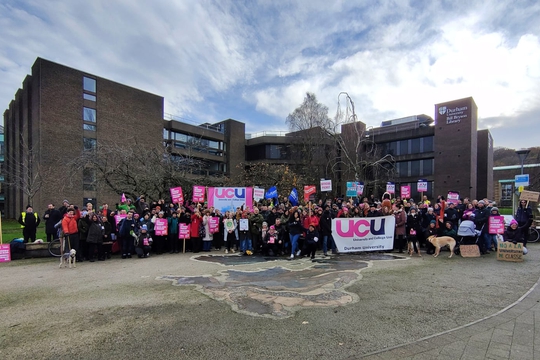Hope and strategy after the MAB

With the MAB coming to an end, lots of people are looking for hope right now. We may have lost the national dispute in so far as the MAB did not result in any change to the pay offer or four fights. We should remember, though, in weighing up that result that management moved twice before the MAB, albeit increasing the pay offer only very slightly. From their side what was most important was to show us that our most effective tool of industrial action – the act of shutting down the degree factory – in fact does not work.
Quite simply it would be wrong to think that the MAB has not worked. Where the MAB has been effective, it has been very effective. Locally at Durham we wrote to management earlier in the summer expressing our intent of launching a local dispute over (50%) deductions and a number of other local employment issues. This resulted in a local package which, whilst being far from everything we would want means that we are not ending this dispute completely empty handed at Durham. Our main bargaining chip was the threat of a local dispute (which remains a possibility) and the offer to encourage members to mark (which is what Edinburgh had in their joint statement that ended deductions there).
An honest diagnosis of why we have lost nationally has to concede that in a significant number of institutions, the MAB had low participation. This highlights a central structural issue for the union that must be overcome: the pattern (which is not by any means absolute) of the most privileged institutions having stronger branches with greater resources and more stable financial positions is a problem. This is partly a result of action over USS having built substantial experience of taking action, but it is also true that the financial position of different universities creates different terrain and stakes.
There are other conditions that made the dispute more challenging – the government and their model of funding HE and the pressures on university (and staff) finances with inflation being key. I have not mentioned the shambolic way this dispute has been led by our union leadership, that has undoubtedly damaged our prospects substantially and is worthy of a separate diagnosis. However, despite all of this the MAB did not fail.
In fact, what the most effective MAB-ing institutions have shown is precisely how we win and how we build. We know what it takes to shut down degree production: strong member participation, regular communication and general meetings, departmental meetings and strong organising at departmental level. None of this happens overnight. It has to be built and it has been built, primarily through the period of militancy that we have seen since 2018, but also by the work of an older layer of activists who kept branches alive through the 1990s, 2000s and 2010s. This is the other genie that management want to put back in the bottle – they want to bring the period of post-2018 militancy to an end.
Fundamentally I do not believe that is possible, or at least, it should not be easy. Firstly, the structural conditions around pay, casualisation, equalities, workload and pensions are not going to disappear. Secondly, and here we must look to ourselves, we must not let what we have learned collectively disappear. We have shown that we know how to cause very serious disruption that most management teams want to avoid. We are likely to face a period where members feel disheartened and the coming ballot will be undoubtedly difficult, particularly with the current leadership and political make-up of HEC where the right now have a slim majority.
What we have to do is take the time to reflect but more importantly build capacity within and, equally importantly, between branches. We know now where our weak-points are. We know the areas of the university where we are stronger and where we are weaker (and so do management). We know the institutions that are stronger and those that are weaker and this point is key. We will face similar difficulties if we do not organise between branches to deepen the organising power and strength across the whole university sector. We must acknowledge the structural divisions between institutions and the greater difficulties faced when organising in universities that are more vulnerable to the violence of the neoliberal market in higher education.
We cannot wait for national leadership or local regional structures to do this for us. Our current leadership is more interested in ego-boosting via twitter than actually thinking about what is necessary. Regional structures are mixed and so is the national bureaucracy. Neither are really organised around the political education that is needed for both members and organisers or the practical forms of support that would empower and strengthen branches. This is an utterly absurd position but we must ignore that. Our job is to build grassroots strength and militancy at a local level.
We also need to concern ourself with the national structure – it must not be run by people with no or little experience of the everyday reality of local members’ struggles to organise. But we should focus on building from the bottom first and as a priority, recognizing that we cannot trust the current (or indeed future) leadership one iota without the pressure that rank and file, grassroots militancy creates.
Branch to branch solidarity and sharing of skills is critical. The Troublemakers and Ella Baker New Organising conferences of this summer provide a model that we should be looking to replicate. We need weekend schools of organising within UCU and we need the relationships between members and organisers across branches that can make that possible. We held a joint rally with the NEU in Durham and at the end of speakers encouraged people to do ‘activist speed dating’ – finding a member from another union and talking to them about why they were on strike. We were planning a longer activity (with a shared lunch too) which was scuppered by the pause (just another reason to be angry about how this dispute was led – I am, I’m furious, but anger without hope and strategy is stupidity).
This sort of relationality is going to be key to continuing to build and organise. Locally at Durham we are thinking about using one of the national strike days to plan our action and work for the year. There’s also discussion of similar regional organising across the North-East. In London there will be a similar event.
Avoiding losing momentum is important. We have shown ourselves what we need to do to build capacity and power. It matters that we continue to think, build and organise. There is no other source of collective hope for a better future in higher education and beyond. It will come from ourselves as workers working in solidarity with our students, or it will not come.
author
Sol Gamsu
Subscribe to Notes from Below
Subscribe now to Notes from Below, and get our print issues sent to your front door three times a year. For every subscriber, we’re also able to print a load of free copies to hand out in workplaces, neighbourhoods, prisons and picket lines. Can you subscribe now and support us in spreading Marxist ideas in the workplace?
Read next

Labour Casualisation in UK Higher Education (Part 2)
by
Roberto Mozzachiodi
/
Aug. 21, 2023

